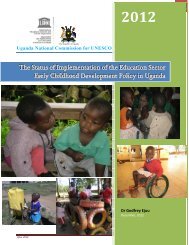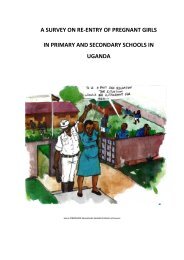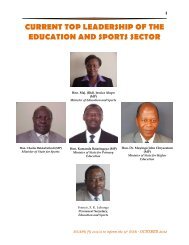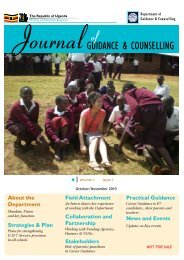Part I - Ministry Of Education and Sports
Part I - Ministry Of Education and Sports
Part I - Ministry Of Education and Sports
You also want an ePaper? Increase the reach of your titles
YUMPU automatically turns print PDFs into web optimized ePapers that Google loves.
In a related effort to achieve EFA goals <strong>and</strong> MDGs 2 &3, Ug<strong>and</strong>a became eligible for a Grant<br />
from Global <strong>Part</strong>nership for <strong>Education</strong> Fund during the period under review. The grant’s specific<br />
objectives are to: improve the learning environment in schools through provision of key<br />
infrastructure; strengthen capacity to deliver quality teacher training; ensure provision of a<br />
minimum package of learning material to all public schools <strong>and</strong> teacher training colleges; <strong>and</strong><br />
strengthen capacity of government systems for education service delivery.<br />
2.3 Institutional Arrangements<br />
The <strong>Education</strong> <strong>and</strong> <strong>Sports</strong> services are delivered through the <strong>Ministry</strong> of <strong>Education</strong> <strong>and</strong> <strong>Sports</strong><br />
Headquarters (comprised of 11 departments <strong>and</strong> 8 affiliate bodies under the <strong>Ministry</strong>).<br />
Within the <strong>Ministry</strong> Headquarters, the adoption of the SWAp in 1990s led to a creation of new<br />
structures to increase stakeholders’ participation, promote a holistic <strong>and</strong> forward looking<br />
approach to policy <strong>and</strong> planning as well provide common reporting frameworks.<br />
Such structures include: Top Management Meeting, <strong>Education</strong> Sector Consultative Committee,<br />
Departmental <strong>and</strong> crosscutting Working Groups (i.e. the Sector Policy <strong>and</strong> Management<br />
Working Group the Policy Clearing House, the Monitoring <strong>and</strong> Evaluation Working Group,<br />
the Sector Budget Working Group, etc.) <strong>and</strong> annual sector reviews.<br />
The <strong>Ministry</strong> has intersectoral linkage with other lineMinistries (i.e. <strong>Ministry</strong> of Finance,<br />
Planning <strong>and</strong> Economic Development MoFPED, <strong>Ministry</strong> of Public Service MoPS <strong>and</strong><br />
<strong>Ministry</strong> of Local Government MoLG, <strong>Ministry</strong> of Gender Labour <strong>and</strong> Social Development –<br />
MoGLSD) <strong>and</strong> Local Government authorities.<br />
In addition to the above, the private sector i.e. individual investors, Civil Society Organizations,<br />
Faith Based Organizations, NGOs (both local <strong>and</strong> international) <strong>and</strong> Communities complement<br />
the public sector in providing education <strong>and</strong> sports services in the country.<br />
All education services provided by the private sector are however regulated, monitored <strong>and</strong><br />
supervised by the <strong>Ministry</strong> of <strong>Education</strong> <strong>and</strong> <strong>Sports</strong>.<br />
2.4 The Legal <strong>and</strong> Regulatory Framework<br />
The overall Sector’s Legal <strong>and</strong> Regulatory Framework is derived from the Supreme Law; the<br />
Constitution of the Republic of Ug<strong>and</strong>a (1995). It is supplemented by the Government White<br />
Paper on <strong>Education</strong> (1992), <strong>Education</strong> Act (2008), BTVET Act (2008), Universities <strong>and</strong> other<br />
Tertiary Institutions Act (2001), UNEB Act (1983), NCDC Act (2000) <strong>and</strong> <strong>Education</strong> Service Act<br />
(2002) among others.<br />
ESSAPR FY 2011/12 to inform the 19 th ESSR – OCTOBER 2012<br />
7








